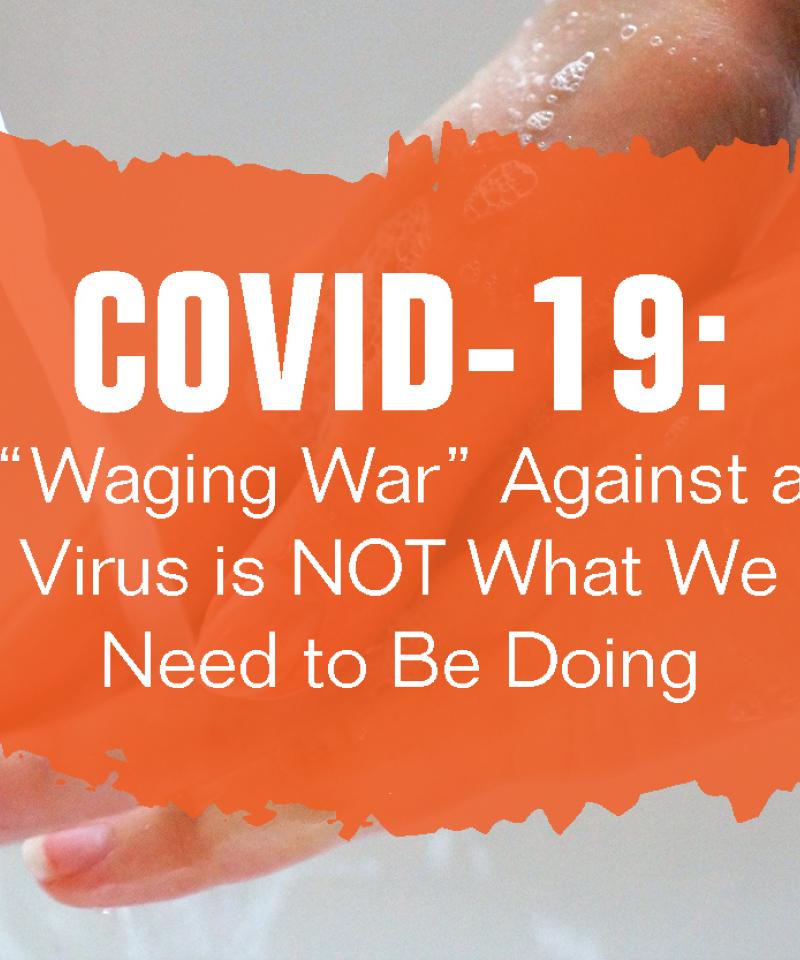COVID-19: “Waging War” Against a Virus is NOT What We Need to Be Doing

As towns and whole countries shut down in order to “flatten the curve” of outbreaks of the coronavirus, we are at risk of choosing the wrong analogy for what we collectively need to do in these perilous times. “Waging a war” is the most deceptively alluring analogy for mobilizing private and public resources to meet a present danger. We should, however, resist that allure.
We have learned – feminist investigators have taught us repeatedly – that in myriad countries and across generations war waging has fueled sexism, racism, homophobia, autocracy, secrecy and xenophobia. None of those will prevent a pandemic. They will never promote trustworthy science and functional medical infrastructures. They will not protect the most vulnerable among us. They will not keep us all safe. They most certainly will not lay the groundwork for post-pandemic democracy.
War waging, nonetheless, is such a tempting analogy precisely because so many of us and so many of our cultural and political leaders cherry-pick their wars and cherry- pick what they want us to remember about each war.
Most Americans anxious about the coronavirus today did not experience World War II. Maybe that makes this allegedly “Good War” the go-to analogy for rosy war waging. As taught in too many schools and as narrated in too many movies and commemorated in too many public ceremonies, World War II was a time when “all Americans pulled together,” when “everybody sacrificed.” It was the war that gave us a “common purpose.” We all supported “our boys.” We faced a “common foe.” The foe was unarguably “evil.” On the Home Front, “GI Joe” and “Rosie the Riveter” were model citizens. As icing on memory’s cake, Americans became in waging that war the “world’s saviors.”
As anti-militarist feminists thinking about how best to address the serious global and local challenges presented by the coronavirus, we try to craft approaches that enhance social justice, gender equity, and sustainable peace. We may imagine that that inspiring triad is the polar opposite of war waging. Yet for the many Americans who sentimentally and selectively remember World War II, their favorite wartime promoted all three. Their romanticized version of Americans’ World War II is a version in which war “brought people together,” in which “everyone pulled their own weight,” in which “peace was won.” GI Joe got to go to college and to buy his dream house. Rosie got childcare and decent pay – temporarily.
In other words, while feminists may think of war waging and feminist peace building as opposites, the most militarized among us are likely to think of waging the “good war” as promoting solidarity, justice and women’s expanded opportunities in the name of winning the peace.
As happens in so many countries, this rosy picture of the cherry-picked war memory depends on cherry picking which experiences of that war are remembered. For example, Americans who are sentimentally imagining that today we could wage a “World War II- type war” against the fast-spreading coronavirus, it is proving convenient to forget about the 1940s wartime internment of law-abiding Japanese Americans. It is likewise uncomfortable to be reminded that the ranks of the US Army and Navy were racially segregated during the fondly remembered Good War.
Over the past forty years, American feminist historians such as Blanche Weisen Cook, Mary Louise Roberts, Brenda Moore, Jeanne Wakatsuki Houston, Maureen Honey and Alison Bernstein have done the careful research it takes to rub the rosy tint off our collective glasses. These researchers have revealed that Americans waged the so-called Good War by promoting prostitution, by enforcing racist, homophobic and anti-Semitic practices, and by making of false promises to women.
Today, one can imagine that waging “a World War II-type war” against a fast-spreading disease is a desirable strategy only if one willfully ignores the findings of feminist historians and refuses to absorb the crucial political lessons they have taught us about the actual costs of turning any collective civic effort into a “war.” To mobilize society today to provide effective, inclusive, fair and sustainable public health, we need to learn the lessons that feminist historians of wars have offered us. To do that, we need to resist the seductive allure of rose-tinted militarization.
This article was first published by Women's International League for Peace and Freedom (WILPF) on 23rd March 2020.
Add new comment